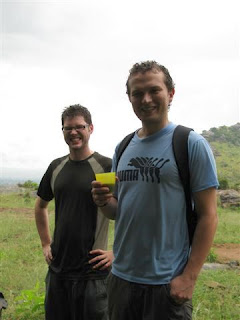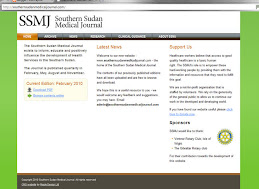You may think that the title of this blog post may imply some deep existential treatise on the human condition to follow, so I apologise but the intended scope is a little narrower. Actually, having passed the halfway point in our trip now, I wanted to offer some reflections on why we’re here, what we’ve done and what we’re planning to do.
By way of another sad announcement, subsequent to some recent upgrading at Tearfund, our computers no longer recognise the internet. This limits our connectivity severely, to the extent that posting anything is difficult, especially photos. I'm borrowing a laptop at present but it still takes a long time. We get a trickle in the mornings at the hospital, enough for emails (without attachments please) but otherwise we're struggling
Part of our overall game-plan this time in Juba has been deliberately much more reactive than last time. I think if Dave and I reflect upon some of our aims and ambitions coming to Juba in 2008 it’s clear that what we had in our mind for our objectives before coming ended up not being relevant at all, and some of our best achievements cropped up completely unlooked for. Even though coming back here having spent all that time last year and I was well orientated within Juba and the hospital, we still felt it a worthwhile strategy to come with the aim to above all be useful to the Southern Sudanese and let them set our agenda, and not push our preconceptions of what we think they need.
That’s not to say that we’re completely aimless, mind. We always plan and structure our week’s objectives in advance to guide our time. But having the luxury of a decent amount of time here, we planned to observe (generally from within by participation) hospital life for a good few weeks before trying to fiddle with anything in the name of “improvement.” It’s an absolutely fatal mistake to suppose, even in the name of ‘aid’ or ‘development’, that the Southern Sudanese (and I guess by extension Africans in Africa in general) are incapable of solving their own problems without Western intervention. We’ve been fortunate enough because of our situation working here, with and for these guys, that this kind of tacit and insidious ‘white superiority’ thinking (doubtless aided somewhat by prevailing media images of helpless babies covered in flies and the like) has never had the opportunity to take hold. It simply can’t when we see every day how hardworking, dedicated, talented, creative, clinically competent (and brilliant in some cases), warm, welcoming (and not forgetting downright hilarious) these people can be. And yes, I guess there are some lazy folks here too, but pick at random any hospital, or group of people worldwide, and you’ll find the same.
Dario and Louis
So given the above, it would both unwise and perhaps insulting to come marching in with our agendas trying to change this or fix that. For one thing, just because a system is not like ours, doesn’t mean it’s wrong. Often there are very good reasons, and an equivalent Western system wouldn’t work here. Something worth remembering. So we feel time invested in being ‘actively passive’ is never wasted. I mean, for one thing we’ve learnt a heap about tropical diseases that we’d probably never see in the UK, which is extremely valuable professionally if nothing else. So basically we’ve been here working hard, making friends, getting to know the place.
Of course have certain advantages having been educated and worked in British hospitals, which we’re in a position to share with people here. In fact, on reflection I think that many of the things that could most improve the hospital care here (if done sensitively and sensibly) is good clinical governance, management systems and education structure - probably more so than pure clinical work. This is something we can help a little with, having observed and absorbed a lot of these modern hospital concepts. We came here last year with a deep commitment to the power of teaching, rather than the typical knee-jerk (and beloved western) reaction to give ‘stuff.’ I still hold to that presupposition, but I think my position has matured somewhat. “I think you’ll find it’s not as simple as that...” to quote the marvellous Ben Goldacre (As an aside, Bad Science was one of the best books I read last year.) Teaching’s important as a central pillar, but can only function as intended as part of a multifaceted and sustainable approach.
Now, sustainability is the name of the game in any kind of development work (although I’m reluctant to apply that term to our work – it seems a little grandiose!) and the problem with just doing clinical work (I mean seeing patients, going on ward rounds, the normal doctor stuff) as just pure service provision for the hospital, is that it’s totally unsustainable, i.e when we leave, that service (small as it is) finishes. It’s not completely pointless because a) it’s a good education experience for us, clinically and in terms of hospital structure and function b) it’s a good way to make friends and gain credibility with hospital staff c) it’s good fun and professionally satisfying to just ‘be a doctor’ and treat patients and d) a lot of ‘teaching’ (in the broader sense of the term) happens outside of the classroom and on the job with modelling good practice and examples. But it’s certainly in itself not a long-term sustainable solution to any clinical needs that exist within JTH.
Ward Round with Dr Andrew
Dario showing us his (not quite finished) house
So we’re keen to always a) be useful and take our cue from the bosses here and b) offer the things we can provide more uniquely as Brits (there are plenty of other very competent Sudanese doctors on the wards). This tends to nudge us more towards sharing things to do with modern hospital / clinical governance concepts and paradigms such as evidence based medicine, clinical audit, research, some teaching (such that we can) and ultimately, perhaps more unglamorously, spreadsheets. This is a (medical) cross-cultural exchange in action for mutual benefit.
So, this has formed another part of our day to day work. Being doctors and thus having a good grasp of the clinical issues but also being familiar with concepts in research, data analysis and clinical audit and of course IT, a couple of the consultants here have set us to work analysing some data for them. It’s not as outwardly sexy as “saving lives” or whatever but if you think about it, it fulfils our ambitions very well as a) It’s lead directly from the demands of JTH b) It something unique that we can offer because of our training and background c) It’s sustainable and has long term benefit because the data is useful and important (knowledge is power, after all) and can guide hospital policy in the future.
Teaching for the Obs and Gynae department
A good example of this from last year is the clinical audit work we did on recording and acting on vital signs, together with the research we did on the peak in hospital mortality occurring within the first 24 hours of admission, implying a focus was needed on acute care. This of course directly guided a lot of our work, but I’m only just realising how that data and those graphs we generated have seeped into the hospital’s subconscious and is still working. (For example, only the other day we found out that, completely independently of us, Matron Susan has set up a sort of resuscitation room in Outpatients to make sure that serious medical cases have been cannulated and started emergency fluids and treatment before getting to the ward. Brilliant.)
Specifically, at the request of Dr Merghani (the head of Obs & Gynae) we’ve analysed and presented all the years worth of caesarean sections conducted in the hospital. A pretty important topic (especially in a country which reputedly has the highest maternal mortality rates in the world) and also uncovered some interesting anaesthetic-related data which, in an audit component, has great potential to improve patient care. We’re currently working on another, more involved research project for Dr Dario (the head of surgery) analysing all of the operated gunshot (and mine/grenade blast) wounds in JTH since 2006. Data recording is frustratingly limited, but it’ll be very interesting to try and look for trends developing from essentially war-wounds in the post-war years in Juba since the Comprehensive Peace Agreement in 2005. And it’s useful data for Juba because no-one’s analysing any of it, so they don’t really have any concrete ideas of numbers (which makes planning very difficult.) We’re also looking at trends in demographics over time, and looking for any other patterns. The results again have implications for surgical and anaesthetic training and all sorts. It’s a lot of quite tedious spreadsheet work (750 cases processed so far and still going) but on the flipside, afterwards we’ll know more about operated gunshots in JTH (2006-2009) than anyone else in the whole world! Which is quite cool to think about... :o)
We play badminton with varying degrees of success
So we’re plugging away at that (we have a deadline in November because Dario wants us to present it at an ICRC war surgery conference), doing some ward work, and also planning some more teaching on basic emergency medical care (and some other things) for the nurses and clinical officers in due course. We’re always on the lookout for other ways to generally be useful, so doubtless other opportunities will present themselves. So I hope that offers a bit of an explanation. We had a trip to the Ministry of Health the other week and met Dr Loi, the Director General of Curative Services (i.e. the hospitals) and had a good chat and showed him some of our work.
Artist's impression of us getting rained on up the mountain
So what else? Well, socially we’re getting on well with each other and all the various other people we meet along the way. We had a good walk up a mountain (ish) the other weekend, which started overcast, and then the clouds came down onto us (as we were at the top) and we got drenched. However, after a slippery descent, some picnic coffee and cinnamon buns courtesy of Kate cured all our woes. But the cloud did spoil the views of Juba city somewhat, so it may need another trip.
We had a good time out the other afternoon with Dario and Louis taking us to show us the houses that they’re building for themselves. That was good fun – Louis is further along with his and it looks rather grand with some great pillars etc.
Louis' house
We’re looking forward most to hot showers and cold nights (and warm beds) and of course Christmas at home with family and friends. Also some nice cheese. And proper cups of tea. Let’s not get ahead of ourselves...
Pretty cool giant millipede Ben found. They really tickle.
Sorry this post has been both overdue and rather longer than usual. I’ve said that I think blogs should be little and often, and I stand by that. Turns out I’m just not able to live up to that standard! Although I partially blame our internet woes.
Goodbye
James & Matt





















No comments:
Post a Comment